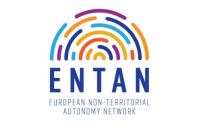
Call for Abstracts
2nd ENTAN conference:
Non-Territorial Autonomy as an Instrument for Effective Participation of Minorities
Budapest, 6-7 November 2020
The European Non-Territorial Autonomy Network (ENTAN) invites applications to participate in its second conference in Budapest on 6-7 November 2020.
ENTAN is a COST Action aimed at examining the concept of non-territorial autonomy (NTA). ENTAN particularly focuses on NTA arrangements for reducing inter-ethnic tensions within a state and on the accommodation of the needs of different communities while preventing calls to separate statehood. The main objective is to investigate the existing NTA mechanisms and policies and to develop new modalities for the accommodation of differences in the context of growing challenges stemming from globalisation, regionalisation and European supranational integration. The network fosters interdisciplinary and multidisciplinary group work, and provides for training and empowerment of young researchers, academic conferences and publications, as well as for the dissemination of results to policy makers, civil society organisations and communities.
Despite the contemporary theoretical and normative expectations surrounding the concept of non-territorial autonomy as well as the growing literature, there still remains the need to investigate its historical antecedents and background, and the diverse empirical contexts, modalities and conditions in which NTA was/is implemented, or the processes in which groups make claims for recognition and autonomy in contemporary societies. The aim of the second ENTAN conference is to examine how the different NTA models are being implemented and contribute to effective participation and representation of minorities in public life. Which activities, policies and institutional structures from diverse contexts can be considered as forms of NTA? What separates, if at all, group organisation, ethnic representation, consociationalist power-sharing or neoliberal outsourcing from NTA? Whether and how can NTA regimes be clearly demarcated from territorial forms of diversity management? Why do states opt to establish and even constitutionally entrench NTA arrangements? To what extent do the latter meet minority demands, reflect to internal divisions, help to mitigate territorial aspirations and/or serve other instrumentalist considerations and function merely as lip service, window-dressing and state-controlled institutions in practice? Under what conditions do minority leaders and activists make claims for NTA and which communities may benefit most from these policies? Does NTA offer the potential to prevent, mitigate or manage ethnic conflicts? To what extent NTA is capable to address ethnic discrimination and socio-economic exclusion?
Possible but not exclusive areas of discussion are:
- NTA as an instrument for effective participation of minorities in political, economic and cultural life and the implementation of NTA in nation- and multi-national states
- historical cases of NTA as a form of minority participation
- territoriality, groupness, “groupism” and NTA
- human rights, equality, citizenship and NTA
- contemporary NTA models in Europe
- Non-European and post-colonial models and initiatives of NTA
- scope of NTA: group recognition and identities, communal boundaries
- NTA and diverse minority communities (Roma, migrants, refugees, indigenous groups, etc.)
- participation of women and NTA
- extent and content of NTA: rights, competences, funding, legal guarantees, contact with state authorities
- NTA from below: internal affairs and democracy within minorities
- NTA in liberal democracies, non-liberal and authoritarian settings
- cross-border cooperation and the role of kin-states in NTA regimes.
The working language of the conference is English. The conference welcomes papers and panel proposals by both scholars and PhD students. Early career investigators (ECI) and participants from inclusiveness target countries (ITC) are especially encouraged to take part.
Abstracts: Maximum 300 word abstracts (of papers or panels) can be submitted by email to entan@uacs.edu.mk Abstracts should be written in Word or RTF formats, font Times New Roman size 12, following this order: author(s), affiliation, email address, title of abstract, body of abstract, 5-7 key words. A short biography (max. 150 words) of the author(s) is also required.
Abstract submission deadline: 15 June 2020.
Notification of acceptance of abstracts will be sent by 30 June 2020.
Authors whose abstracts have been accepted will be required to submit their papers by 1 September 2020.
Registration: The conference is supported by COST and there is no conference fee.
Selected presenters who are ENTAN members and whose papers have been submitted on time (by 1 September 2020) are eligible for reimbursement of travel and accommodation costs in line with Section 5 of the COST Vademecum. Selected presenters who are not ENTAN members and whose papers have been submitted on time (by 1 September 2020) may be eligible for partial reimbursement of travel and accommodation costs based on availability of funds. Priority in funding will be given to ENTAN members who are authors of papers of top quality and relevance to the conference topic. In case of co-authored submissions, eligible for reimbursement is one of the co-authors only.
2nd ENTAN Conference Committee:
Balázs Vizi, Chair of the 2nd ENTAN Conference Committee, Institute for Minority Studies, Centre for Social Sciences; National University of Public Service, Budapest
Balázs Dobos, Institute for Minority Studies, Centre for Social Sciences, Budapest
Francesco Palermo, Eurac Research, Bozen-Bolzano
Ivan Dodovski, Chair of ENTAN, University American College Skopje
Katinka Beretka, Faculty of Legal and Business Studies “Dr Lazar Vrtakić”, Novi Sad
Natalija Shikova, International Balkan University, Skopje
Robert Hudson, Vice-Chair of ENTAN, University of Derby

